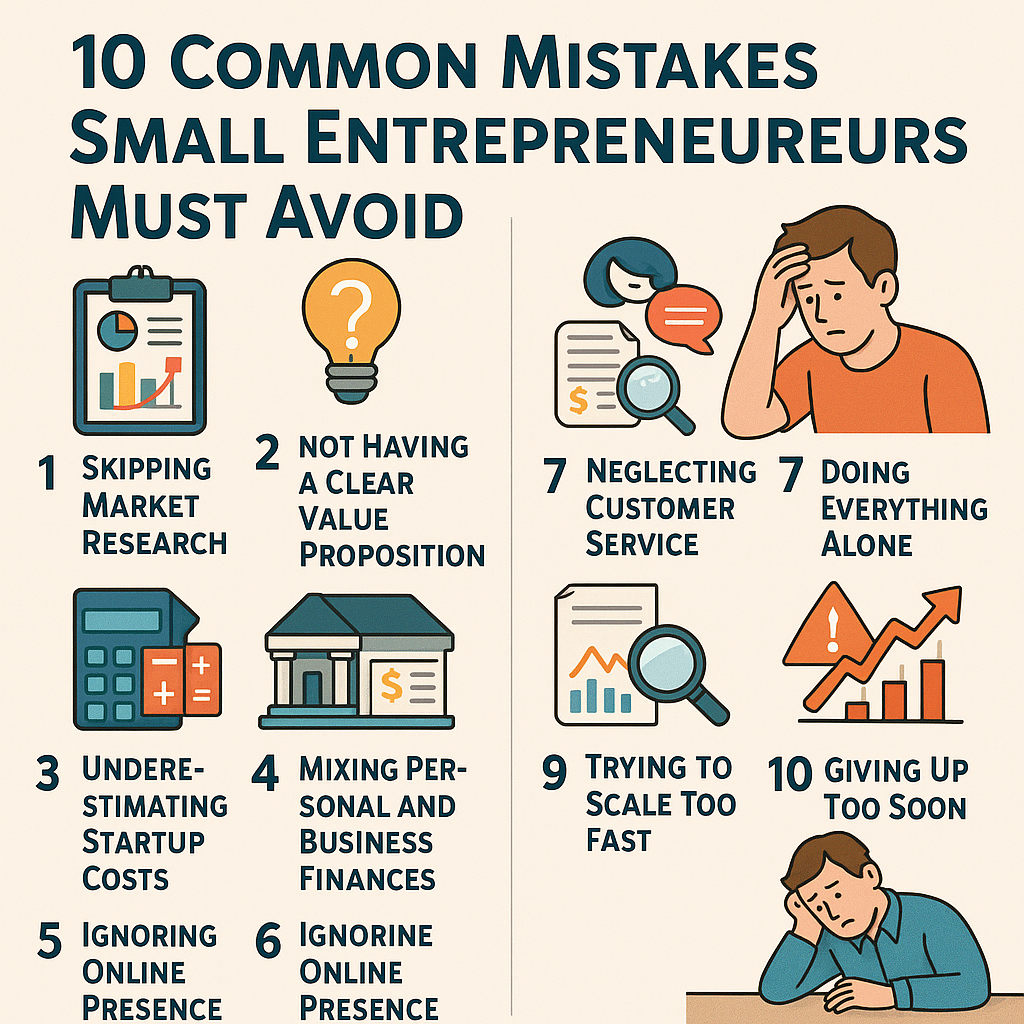Starting a business is exciting, but it’s also full of potential pitfalls. Many small entrepreneurs make avoidable mistakes that cost them time, money, and motivation. By understanding these common errors, you can prepare better and increase your chances of long-term success. Let’s explore ten mistakes you should avoid when starting your entrepreneurial journey.
1. Skipping Market Research
One of the biggest mistakes entrepreneurs make is jumping into business without understanding their market. Without research, you may target the wrong audience, price your product incorrectly, or fail to identify competitors.
How to avoid it:
- Conduct surveys and interviews.
- Research competitors online.
- Identify customer pain points and preferences.
Good research helps you build a product or service people actually want.
2. Not Having a Clear Value Proposition
If you can’t explain why customers should choose your product over another, you don’t have a strong value proposition. Without clarity, your marketing will confuse people, and they won’t buy.
How to avoid it:
- Write a one-sentence explanation of your product’s benefit.
- Highlight what makes your business unique.
- Focus on solving the customer’s problem, not just selling features.
3. Underestimating Startup Costs
Many small entrepreneurs assume they can start with less money than they really need. This leads to cash flow problems and, in many cases, early failure.
How to avoid it:
- Make a list of all possible expenses: equipment, rent, marketing, legal fees, website hosting, etc.
- Always keep an emergency fund for unexpected costs.
- Start small to reduce financial pressure.
4. Mixing Personal and Business Finances
Using the same bank account for personal and business expenses may seem convenient, but it creates confusion and legal risks.
How to avoid it:
- Open a dedicated business bank account.
- Use accounting software to track expenses.
- Pay yourself a salary instead of withdrawing randomly.
This practice makes taxes easier and gives your business more credibility.
5. Ignoring Online Presence
Today, almost every customer checks businesses online before buying. If you don’t have a digital presence, you’re invisible to many potential clients.
How to avoid it:
- Create a professional website.
- Use social media platforms strategically.
- Encourage reviews and testimonials.
Your online presence builds trust and attracts new customers.
6. Doing Everything Alone
Many entrepreneurs believe they can handle every task — sales, marketing, accounting, and customer service. This quickly leads to burnout.
How to avoid it:
- Delegate tasks where possible.
- Use freelancers or virtual assistants.
- Automate repetitive work with software tools.
Focusing on your strengths increases productivity and growth.
7. Neglecting Customer Service
Customers are the lifeblood of any small business. Poor service or lack of communication can ruin your reputation.
How to avoid it:
- Respond quickly to questions.
- Train staff (if you have any) to be polite and helpful.
- Treat every customer like your most valuable one.
Excellent service can turn first-time buyers into loyal advocates.
8. Not Tracking Finances Regularly
Some entrepreneurs avoid looking at their numbers until tax season. By then, it may be too late to fix financial issues.
How to avoid it:
- Review income and expenses weekly.
- Use financial dashboards or apps.
- Adjust pricing or spending if numbers show warning signs.
Data-driven decisions keep your business financially healthy.
9. Trying to Scale Too Fast
It’s tempting to expand quickly once you see early success, but growing too fast can stretch your resources and lower quality.
How to avoid it:
- Focus on consistent revenue before scaling.
- Improve systems and processes first.
- Grow step by step instead of rushing.
Controlled growth is safer and more sustainable.
10. Giving Up Too Soon
Many small entrepreneurs expect instant results. When sales don’t explode in the first months, they give up. But most businesses need time to grow.
How to avoid it:
- Set realistic goals.
- Be patient and consistent.
- Remember that setbacks are part of the journey.
Persistence often makes the difference between failure and success.
Final Thoughts: Mistakes Are Lessons
Mistakes are part of entrepreneurship, but avoiding the most common ones gives you a huge advantage. By doing proper research, managing finances wisely, delivering great customer service, and being patient, you set a solid foundation for success.
Entrepreneurship is not about being perfect — it’s about learning, adapting, and moving forward. Stay focused, avoid these pitfalls, and you’ll increase your chances of building a thriving business.
